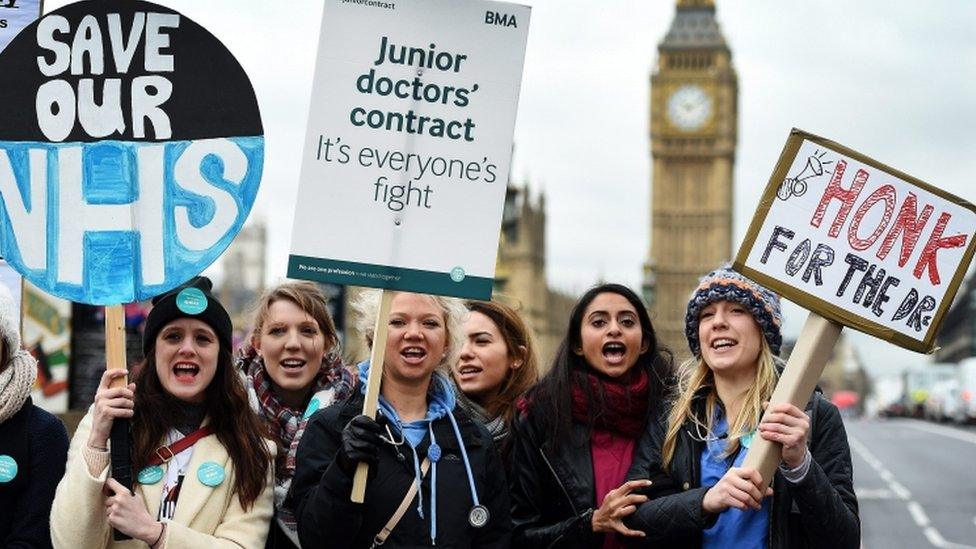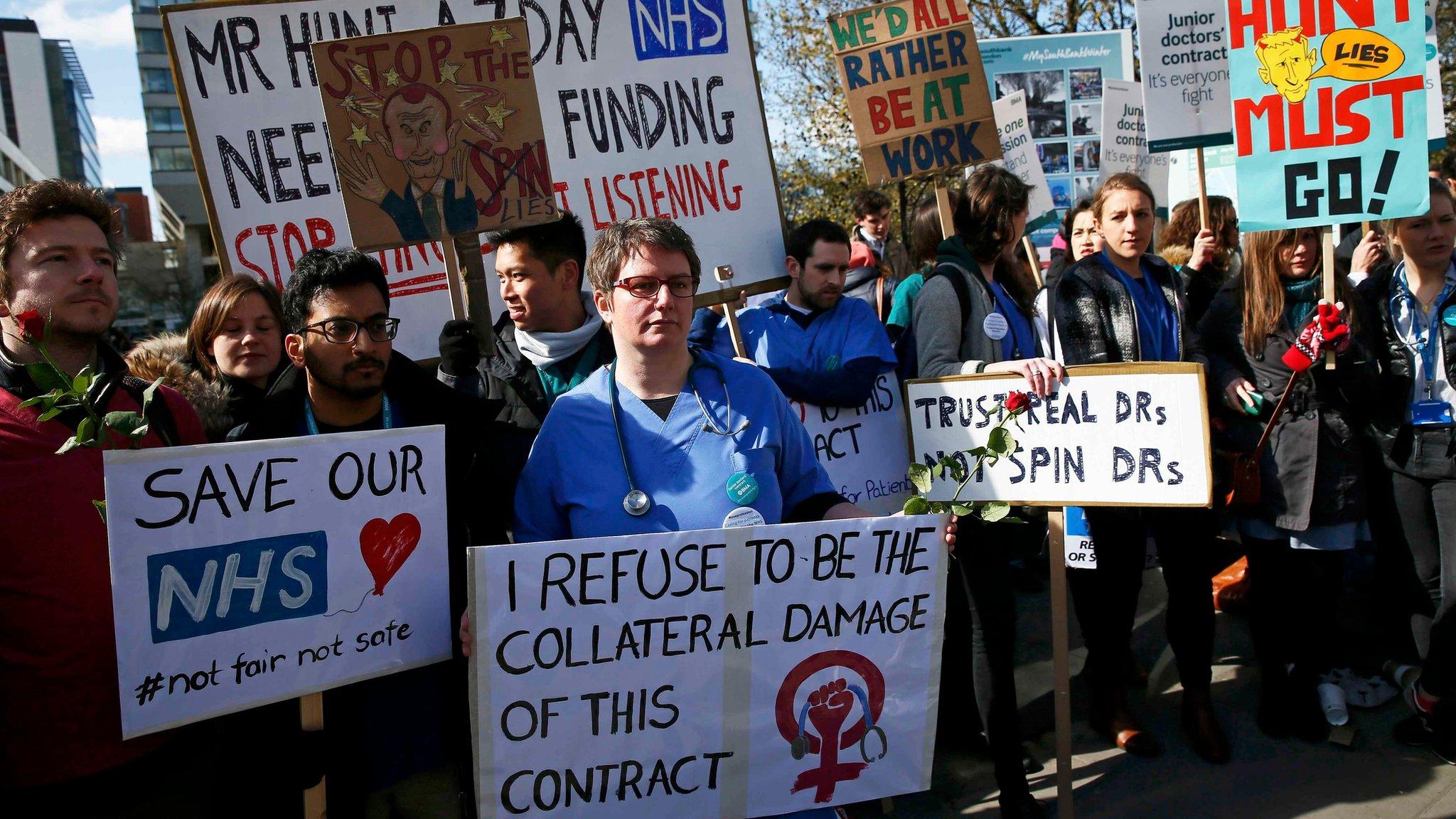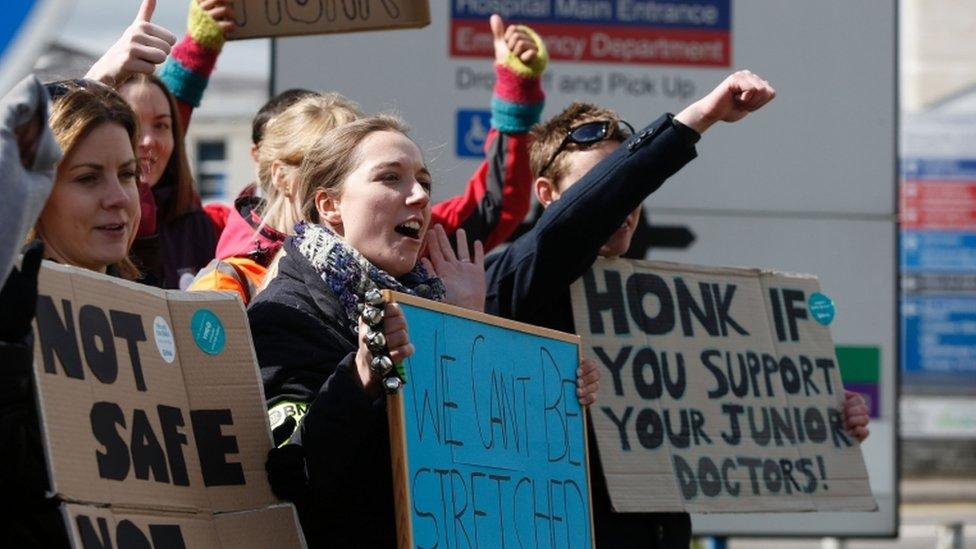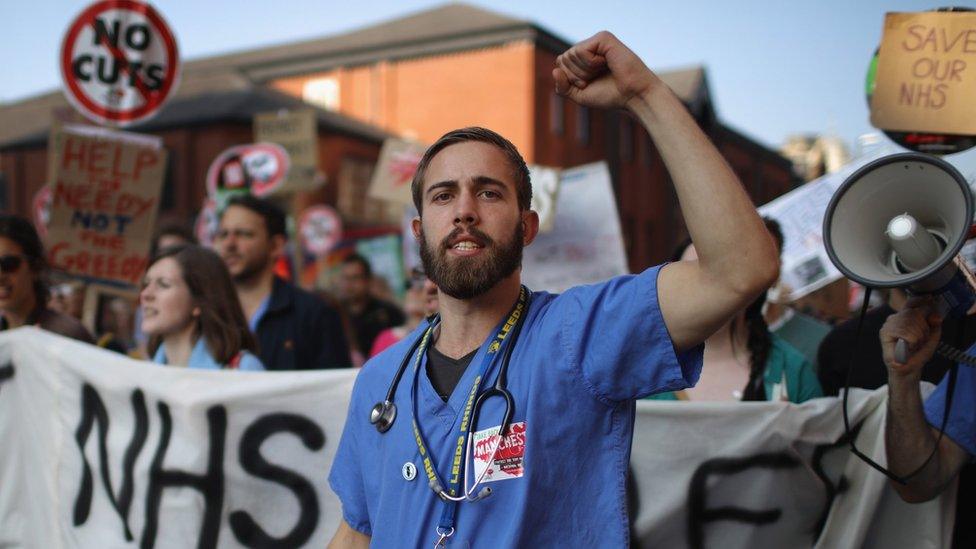Striking doctors 'playing politics', says PM
- Published
"The government is putting patients first. The BMA should be putting patients first, not playing politics" - Theresa May
The British Medical Association has been accused of "playing politics", by the prime minister, after the union announced a week of strikes in England.
Theresa May said the contract being imposed on junior doctors was "safe" and urged them to put patients first.
It comes as hospitals are drawing up contingency plans for the five consecutive days of all-out stoppages, which get under way on 12 September.
The BMA said it had no choice as its members were opposed to the contract.
In her first public intervention on the dispute, the prime minister gave her full backing to Mr Hunt, saying he was an "excellent health secretary".
She called on the union to call off the strikes, adding that the NHS had "record levels of funding" and "more doctors than we've seen in its history".
She went on: "The government is putting patients first, the BMA should be putting patients first - not playing politics."

It came after Mr Hunt predicted the five days of strikes would "cause misery" for patients, with 100,000 operations and one million hospital appointments postponed.
The all-out strikes will take place from 08:00 to 17:00 BST from 12 to 16 September with more expected to follow.
The plans being put in place by hospitals include postponing routine operations, such as knee and hip replacements, re-deploying consultants and nurses to urgent and emergency settings and cancelling study leave for other staff.

The worried patient
Simon Emmet has a kidney stone and is waiting for surgery. He is meant to have it in the next four weeks, but is certain the strikes will push it back.
"I can't see that the strikes won't delay my surgery. There are only two people at the hospital that can carry it out, meaning I already have a four-week waiting time.
"I've been to A&E with abdominal pain twice in the last week. I constantly feel nauseous and I'm in constant pain. I have to take very strong painkillers which make me drowsy.
"I work from home as an IT consultant and I have to balance taking enough painkillers so I can work through the pain but no so many that I'm too dopey to work. Often I end each day in so much pain that I just lie on the floor waiting for the next day's work.
"I'd really like to believe the doctors have the patient's best interest at heart but it doesn't seem right. They've been arguing about this for three years."

Chris Hopson, chief executive of NHS Providers, which represents hospital trusts, said the strikes would have "a very serious impact on a very large number of patients".
He said hospitals had only been given 12 days' notice, "which is much less than we've ever had before".
Chairman of the BMA council says decision to strike reached after "exhaustive debate"
Katherine Murphy, of the Patients Association, said she was "gravely concerned" about the prospect of five days of strikes, which would have a "catastrophic impact".
"Many patients may be very unwell or vulnerable, and, so, we cannot predict the distress or pain this will cause to everyone this will affect."
She urged the government to get back round the table and negotiate with the BMA.
Dr Mark Porter, chairman of the BMA council, blamed the "continued reluctance" of Mr Hunt to do "anything other than impose a contract on junior doctors".
He said the BMA council was united behind junior doctors, but would not be drawn on how close the vote held by the governing council had been.
He told the BBC: "The reason this dispute has become protracted is not because anybody on our side wanted it to be protracted; it's because the single unifying thread throughout every part of this dispute has been the insistence of the government on moving ahead without agreement."
Junior doctors have already taken part in six days of strikes this year, including two all-out stoppages.
Industrial action was put on hold in May when the two sides got back round the table at conciliation service Acas.
That resulted in a new contract being agreed, which BMA leaders encouraged members to accept.
But when it was put to the vote, 58% of medics rejected it, prompting the resignation of the BMA junior doctor leader Johann Malawana, and causing ministers to announce once again that they would impose the new terms and conditions.

The imposed contract

Basic pay to rise between 10% and 11% on average
System of supplements paid which are determined by how many weekends - those working one in two will get 10% on top of basic salary
Nights to attract an enhanced rate of 37% above normal time
Replaces old system whereby weekend or night work can attract up to double time
First doctors to go on new terms in October with much of the rest of the workforce to follow by next summer
The British Medical Association says it is not fair on those that work the most weekends or part-timers

A new junior doctor leader, Dr Ellen McCourt, was appointed and, in August, the committee she leads called for the union's leaders to sanction fresh strikes.
She told BBC Breakfast the new contract "is not good for our patients" and risked losing doctors from the profession.
"We're devastated that the government has not listened to junior doctors," she said.
"They've not listened to the rejection of the contract and we've been left with no other choice than to take further industrial action."
Dr McCourt said the contract, which will start being rolled out in October, "fails to treat all doctors fairly".
"This contract will be in place for many years; it will have a direct impact on patient care and whether we can attract and keep enough doctors in the NHS."
- Published31 August 2016

- Published1 September 2016

- Published12 August 2016

- Published6 July 2016

- Published1 September 2016
